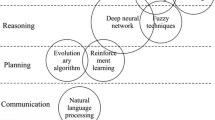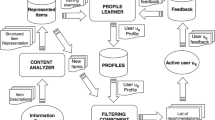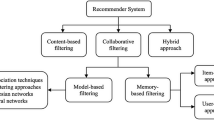Abstract
To proactively assist engineers in finding and reusing massive design lesson-learned knowledge (DLK), knowledge recommendation has become a key technology of knowledge management. However, in collaborative product design, complex multitask context information disrupts the perception of engineers’ knowledge needs for every single task. In this situation, traditional knowledge recommendation approach is prone to provide a mixed DLK recommendation list, thus resulting in a lack of pertinence and low accuracy. Facing these challenges, scarcely any reports on context-aware knowledge recommendation in the multitask environment of collaborative product design. Aiming to fill this gap, a multitask context-aware DLK recommendation approach is proposed to assist collaborative product design in a smarter manner. The mutual interference of context information from different tasks is addressed by preprocessing works, multitask knowledge need awareness, DLK recommendation engine, respectively. Therefore, the proposed approach not only effectively acquires engineers’ knowledge needs from different task contexts and pertinently provides the corresponding DLK recommendation list for each task but also guarantees the accuracy of DLK recommendation in multitask context of collaborative product design. To validate the proposed approach, a DLK recommendation system is implemented in a shipbuilding scenario, and some comparative experiments are carried out. Experimental results show that the proposed approach outperforms conventional approaches in the aspects of effectiveness and performance. Therefore, it opens up a promising way to help engineers reuse needed DLK in collaborative product design.













Similar content being viewed by others
References
Abadi, A., Ben-Azza, H., & Sekkat, S. (2018). Improving integrated product design using SWRL rules expression and ontology-based reasoning. Procedia Computer Science, 127, 416–425. https://doi.org/10.1016/j.procs.2018.01.139
Abowd, G. D., Dey, A. K., Brown, P. J., et al. (1999). Towards a better understanding of context and context-awareness (Vol. 1707). Springer.
Achananuparp, P., Hu, X., & Shen, X. (2008). The evaluation of sentence similarity measures. In I.-Y. Song, J. Eder, & T. M. Nguyen (Eds.), Data warehousing and knowledge discovery (pp. 305–316). Berlin: Springer.
Chen, Y.-J. (2010). Development of a method for ontology-based empirical knowledge representation and reasoning. Decision Support Systems, 50(1), 1–20. https://doi.org/10.1016/j.dss.2010.02.010
Chen, Y.-J., Chen, Y.-M., & Chu, H.-C. (2008). Enabling collaborative product design through distributed engineering knowledge management. Computers in Industry, 59(4), 395–409. https://doi.org/10.1016/j.compind.2007.10.001
Chen, Y.-J., Chen, Y.-M., & Wu, M.-S. (2010). Development of an ontology-based expert recommendation system for product empirical knowledge consultation. Concurrent Engineering: r&a, 18, 233–253. https://doi.org/10.1177/1063293X10373824
Chhim, P., Chinnam, R. B., & Sadawi, N. (2019). Product design and manufacturing process based ontology for manufacturing knowledge reuse. Journal of Intelligent Manufacturing, 30(2), 905–916. https://doi.org/10.1007/s10845-016-1290-2
Church, K., & Hanks, P. (1991). Word association norms, mutual information and lexicography. Computational Linguistics, 16, 22–29.
Dai, X., Matta, N., & Ducellier, G. (2014). Knowledge discovery in collaborative design projects. In B. Grabot, B. Vallespir, S. Gomes, A. Bouras, & D. Kiritsis (Eds.), Advances in production management systems. Innovative and knowledge-based production management in a global-local world (pp. 117–123). Berlin, Heidelberg: Springer.
Ebrahimi, S., Villegas, N., Müller, H., & Thomo, A. (2012). SmarterDeals: A context-aware deal recommendation system based on the smartercontext engine. In Proceedings of the 2012 conference of the center for advanced studies on collaborative research, IBM Corp., 2012 (pp. 116–130).
Fereidunian, A., Zamani, M. A., Boroomand, F., Jamalabadi, H., Lesani, H., & Lucas, C. (2010). AALRES: An intelligent expert system for realization of adaptive autonomy using logistic regression.
Frey, B. J., & Dueck, D. (2007). Clustering by passing messages between data points. Science, 315(5814), 972–976. https://doi.org/10.1126/science.1136800
Gruhier, E., Demoly, F., Dutartre, O., Abboudi, S., & Gomes, S. (2015). A formal ontology-based spatiotemporal mereotopology for integrated product design and assembly sequence planning. Advanced Engineering Informatics, 29(3), 495–512. https://doi.org/10.1016/j.aei.2015.04.004
Huang, Y., Jiang, Z., He, C., Liu, J., Song, B., & Liu, L. (2015). A semantic-based visualised wiki system (SVWkS) for lesson-learned knowledge reuse situated in product design. International Journal of Production Research, 53(8), 2524–2541. https://doi.org/10.1080/00207543.2014.975861
Huang, Y., Jiang, Z., He, C., Song, B., & Liu, L. (2014). An inner-enterprise wiki system integrated with semantic search for reuse of lesson-learned knowledge in product design. Proceedings of the Institution of Mechanical Engineers, Part B: Journal of Engineering Manufacture. https://doi.org/10.1177/0954405414555739
Kamsu Foguem, B., Coudert, T., Béler, C., & Geneste, L. (2008). Knowledge formalization in experience feedback processes: An ontology-based approach. Computers in Industry, 59(7), 694–710. https://doi.org/10.1016/j.compind.2007.12.014
Klein, D., & Manning, C. (2003). Accurate unlexicalized parsing. In Proceedings of the 41st meeting of the association for computational linguistics, 06/21/2003 (pp. 423–430). https://doi.org/10.3115/1075096.1075150.
Li, G., Jiang, Z., & Li, X. (2020). A text mining-based approach for modelling technical knowledge evolution in patents. International Journal of Technology, Policy and Management, 20, 318. https://doi.org/10.1504/IJTPM.2020.10033592
Li, M., Li, Y., Lou, W., & Chen, L. (2020). A hybrid recommendation system for Q&A documents. Expert Systems with Applications, 144, 113088. https://doi.org/10.1016/j.eswa.2019.113088
Li, X., Chen, C.-H., Zheng, P., Jiang, Z., & Wang, L. (2021). A context-aware diversity-oriented knowledge recommendation approach for smart engineering solution design. Knowledge-Based Systems, 215, 106739. https://doi.org/10.1016/j.knosys.2021.106739
Li, X., Chen, C.-H., Zheng, P., Wang, Z., Jiang, Z., & Jiang, Z. (2020). A knowledge graph-aided concept-knowledge approach for evolutionary smart product-service system development. Journal of Mechanical Design, 142, 101403. https://doi.org/10.1115/1.4046807
Li, X., Jiang, Z., Liu, L., & Song, B. (2018). A novel approach for analysing evolutional motivation of empirical engineering knowledge. International Journal of Production Research, 56(8), 2897–2923. https://doi.org/10.1080/00207543.2017.1421785
Li, X., Jiang, Z., Song, B., & Liu, L. (2017). Long-term knowledge evolution modeling for empirical engineering knowledge. Advanced Engineering Informatics, 34, 17–35. https://doi.org/10.1016/j.aei.2017.08.001
Liang, J. S. (2020). A process-based automotive troubleshooting service and knowledge management system in collaborative environment. Robotics and Computer-Integrated Manufacturing, 61, 101836. https://doi.org/10.1016/j.rcim.2019.101836
Liu, L., Jiang, Z., & Song, B. (2014). A novel two-stage method for acquiring engineering-oriented empirical tacit knowledge. International Journal of Production Research, 52(19–20), 5997–6018.
Liu, T., Wang, H., & He, Y. (2016). Intelligent knowledge recommending approach for new product development based on workflow context matching. Concurrent Engineering, 24(4), 318–329. https://doi.org/10.1177/1063293X16640319
Lu, J., Wu, D., Mao, M., Wang, W., & Zhang, G. (2015). Recommender system application developments: A survey. Decision Support Systems, 74, 12–32. https://doi.org/10.1016/j.dss.2015.03.008
Ma, S., & Tian, L. (2015). Ontology-based semantic retrieval for mechanical design knowledge. International Journal of Computer Integrated Manufacturing, 28(2), 226–238. https://doi.org/10.1080/0951192X.2013.874593
Malik, R., Subramaniam, L. V., & Kaushik, S. (2007). Automatically selecting answer templates to respond to customer Emails. In International joint conference on artifical intelligence.
Mihalcea, R., Corley, C., & Strapparava, C. (2006). Corpus-based and knowledge-based measures of text semantic similarity. UNT Scholarly Works, 1, 775–780.
Nasir, J. A., Varlamis, I., & Ishfaq, S. (2019). A knowledge-based semantic framework for query expansion. Information Processing & Management, 56(5), 1605–1617. https://doi.org/10.1016/j.ipm.2019.04.007
Nilashi, M., Ibrahim, O., & Bagherifard, K. (2018). A recommender system based on collaborative filtering using ontology and dimensionality reduction techniques. Expert Systems with Application, 92, 507–520.
Pazzani, M. J., & Billsus, D. (2007). Content-based recommendation systems. In P. Brusilovsky, A. Kobsa, & W. Nejdl (Eds.), The adaptive web: Methods and strategies of web personalization (pp. 325–341). Berlin, Heidelberg: Springer.
Peng, G., Wang, H., Zhang, H., & Huang, K. (2019). A hypernetwork-based approach to collaborative retrieval and reasoning of engineering design knowledge. Advanced Engineering Informatics, 42, 100956.
Pereira, J. A., Matuszyk, P., Krieter, S., Spiliopoulou, M., & Saake, G. (2018). Personalized recommender systems for product-line configuration processes. Computer Languages, Systems & Structures, 54, 451–471. https://doi.org/10.1016/j.cl.2018.01.003
Potes Ruiz, P., Kamsu Foguem, B., & Grabot, B. (2014). Generating knowledge in maintenance from experience feedback. Knowledge-Based Systems, 68, 4–20. https://doi.org/10.1016/j.knosys.2014.02.002
Song, B., & Jiang, Z. (2013). Proactive search enabled context-sensitive knowledge supply situated in computer-aided engineering. Advanced Engineering Informatics, 27(1), 66–75. https://doi.org/10.1016/j.aei.2012.10.006
Song, B., Jiang, Z., & Li, X. (2015). Modeling knowledge need awareness using the problematic situations elicited from questions and answers. Knowledge-Based Systems, 75, 173–183. https://doi.org/10.1016/j.knosys.2014.12.004
Song, B., Jiang, Z., & Liu, L. (2016). Automated experiential engineering knowledge acquisition through Q&A contextualization and transformation. Advanced Engineering Informatics, 30(3), 467–480. https://doi.org/10.1016/j.aei.2016.06.002
Toutanova, K., Klein, D., Manning, C., & Singer, Y. (2004). Feature-Rich Part-of-Speech tagging with a cyclic dependency network. In Proceedings of the 2003 conference of the north american chapter of the association for computational linguistics on human language technology—NAACL ’03, 1. https://doi.org/10.3115/1073445.1073478.
Trevisan, L., & Brissaud, D. (2017). A system-based conceptual framework for product-service integration in product-service system engineering. Journal of Engineering Design, 28(10–12), 627–653. https://doi.org/10.1080/09544828.2017.1382683
Villegas, N. M., & Müller, H. A. (2010). Managing dynamic context to optimize smart interactions and services. In M. Chignell, J. Cordy, J. Ng, & Y. Yesha (Eds.), The smart internet: Current research and future applications (pp. 289–318). Berlin, Heidelberg: Springer.
Villegas, N. (2013). Context management and self-adaptivity for situation-aware smart software systems. Ph.D. in Computer Science, University of Victoria.
Villegas, N., Sánchez Pineda, C., Diaz, J., & Tamura, G. (2017). Characterizing context-aware recommender systems: A systematic literature review. Knowledge-Based Systems, 140(15), 173–200. https://doi.org/10.1016/j.knosys.2017.11.003
Wang, Z., Chen, C.-H., Zheng, P., Li, X., & Khoo, L. P. (2021). A graph-based context-aware requirement elicitation approach in smart product-service systems. International Journal of Production Research, 59(2), 635–651. https://doi.org/10.1080/00207543.2019.1702227
Wu, Z., He, L., Wang, Y., Goh, M., & Ming, X. (2020). Knowledge recommendation for product development using integrated rough set-information entropy correction. Journal of Intelligent Manufacturing, 31(6), 1559–1578. https://doi.org/10.1007/s10845-020-01534-9
Wu, Z. Y., Ming, X. G., He, L. N., Li, M., & Li, X. Z. (2014). Knowledge integration and sharing for complex product development. International Journal of Production Research, 52(21–22), 6296–6313.
Yin, X., Sheng, B., Zhao, F., Wang, X., Xiao, Z., & Wang, H. (2019). A Correlation-experience-demand based personalized knowledge recommendation approach. IEEE Access, 7, 61811–61830. https://doi.org/10.1109/ACCESS.2019.2916350
Zhen, L., Huang, G. Q., & Jiang, Z. (2010). An inner-enterprise knowledge recommender system. Expert Systems with Applications, 37(2), 1703–1712. https://doi.org/10.1016/j.eswa.2009.06.057
Zhen, L., Jiang, Z., & Song, H. T. (2011). Distributed knowledge sharing for collaborative product development. International Journal of Production Research, 49(10–11), 2959–2976.
Zhen, L., Song, H.-T., & He, J.-T. (2012). Recommender systems for personal knowledge management in collaborative environments. Expert Systems with Applications, 39(16), 12536–12542. https://doi.org/10.1016/j.eswa.2012.04.060
Zheng, P., Xu, X., & Chen, C.-H. (2020). A data-driven cyber-physical approach for personalised smart, connected product co-development in a cloud-based environment. Journal of Intelligent Manufacturing, 31(1), 3–18. https://doi.org/10.1007/s10845-018-1430-y
Acknowledgements
The authors thank National Nature Science Foundation of China (No.71671113) and the Ministry of Industry and InformationTechnology of China for funding this research.
Author information
Authors and Affiliations
Corresponding author
Additional information
Publisher's Note
Springer Nature remains neutral with regard to jurisdictional claims in published maps and institutional affiliations.
Rights and permissions
About this article
Cite this article
Ji, Y., Jiang, Z., Li, X. et al. A multitask context-aware approach for design lesson-learned knowledge recommendation in collaborative product design. J Intell Manuf 34, 1615–1637 (2023). https://doi.org/10.1007/s10845-021-01889-7
Received:
Accepted:
Published:
Issue Date:
DOI: https://doi.org/10.1007/s10845-021-01889-7




